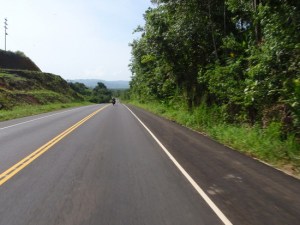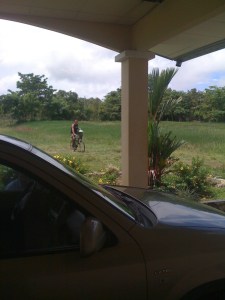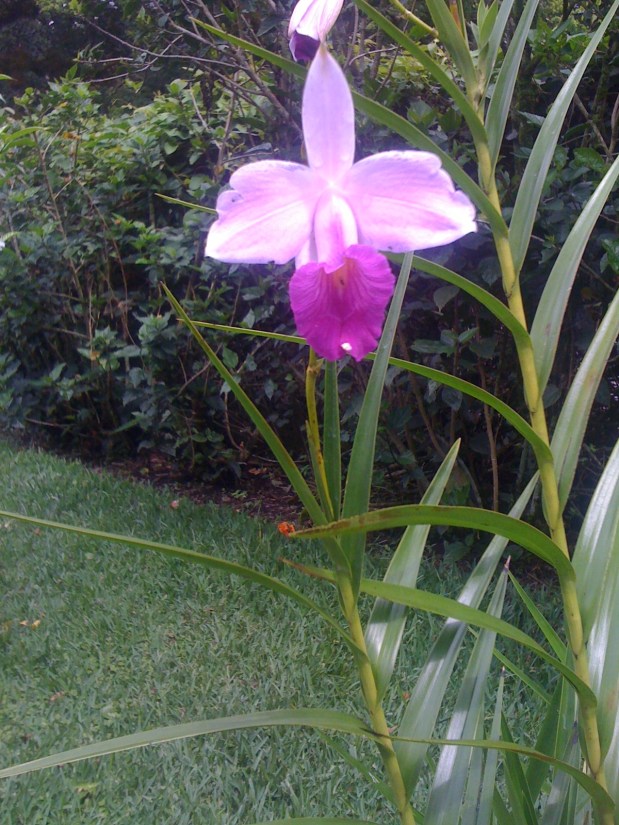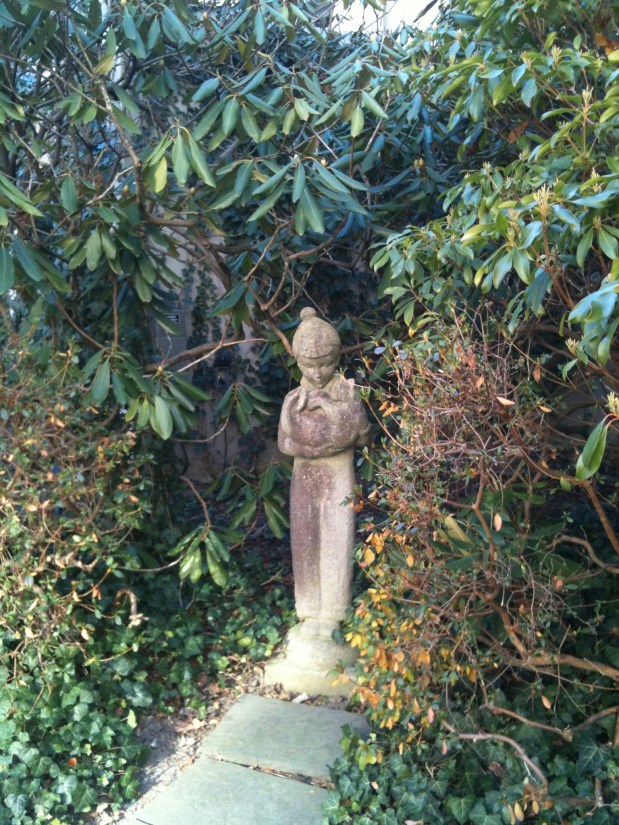I realized that there was one last story I wanted to tell about my mom’s death before moving on to other things. I want to record it because it stands in such sharp contrast with the experiences I have of death and dying as a priest in the United States.
We had always known that my mother’s wish was to be cremated after her death so her ashes could be scattered in the Caldera River, that wonderful and wild mountain river that sweeps by the remains of her childhood home in Boquete and then past the house she and my father built after they moved to Panamá.
In the early years after we found out that Mom’s cancer had metastasized, we planned, with some dread, to have her body transported to Panamá City, the only place in Panamá with a crematorium. About 3 years ago, one was opened in what we jokingly call “The Fair City of David”— capital of Chiriquí, the province where my parents had built their house. When it became clear that the end was near, my older brother Hans went down to David to make the arrangements with “Centro de Cremación Paz y Gloria”. After my mom died, her body would be transported to David, we’d bring a long list of required paperwork to their main office and would then follow the hearse out to the crematorium, located “just outside the city.”
Mom died on Sunday night, and about 10:00 the following morning we found ourselves in the offices of Paz & Gloria. Offices is a generous description. Tucked into a warehouse, little more than a cubicle with furniture that might have been salvaged from a recycle bin, Paz & Gloria had two staff people: the driver of the hearse (actually, a refitted, if slightly battered Toyota van), and a sweet young woman who was the administrative assistant. Hans, my brother, and I were the two official witnesses so we had to give the young woman our passports. My brother explained that the “Paises Bajos (Low Countries)” mentioned on the cover of his passport referred to the Netherlands. The young woman looked puzzled and asked why it was called the “Low Countries.” Hans explained that they were in fact, low.
–“How low?
–“Well, quite a bit of the Netherlands is below sea level”
–“How is that possible?”
–“Well, they have these enormous dikes that keep the sea out of the land”
We could tell that the young woman could not quite wrap her mind around all that but she finished the paperwork and cleared us to follow the “hearse” to pick up my mom at the morgue and take her out to the crematorium.

The Fair City of David
The first part of that journey is something of a blur. David is defined by lots of zinc corrugated roofs and would be a dusty town if it weren’t for the hot humidity that defines that part of the world. So instead, there’s this paste of grime on everything. I don’t think I have ever seen an uglier town than David and frankly, I didn’t want to look much. It was a relief to think that we would be taking my mom away from there on her final journey.

The Panamerican Highway goes right through David; it begins in Canada and extends all the way to Argentina, linking the Americas to each other. We took the Panamerican and headed out of town, my dad, my brother, our driver and I following the van that carried my mom. Soon we were out of town and my brother and I, sitting in the back seat smiled at each other. When we were little, my mom loved nothing more than to put a picnic basket together, and get the kids in the car and go on an adventure. Cali, the city where we lived, is in a valley in the Andes and often, our adventures led to picnics by rivers or up in the mountains. At first this Monday morning, it was sort of cool to be headed out like that because it was so reminiscent of our childhood. But after a while, it started feeling like we sure were going way, way out of town.
Finally, the van turned off onto a side road. About 200 feet off the highway, the pavement ended and we started jouncing along a truly tropical back road. Later we realized that silently, all three of us had apologized to my mom for such a bumpy trip though we reminded her that this had always been what it had been like when we were on one of our really good adventures. The van and we had to stop when a bunch of chickens decided to cross the road. We drove by a mule, tied to a post by the road, swishing flies away. And we drove, and drove and drove, further and further out into the middle of nowhere. After 20 minutes, we pulled off onto a set of tracks in the grass that ended in front of a little building that shimmered in the heat. The van pulled up to a bay while we pulled our car into the main entrance. The van driver got off and tried to open the bay door but found that it was locked. When we tried to go through the front door, it too was locked, though we could hear “chunga-chunga” music coming through from inside—maybe a theft-deterrent?

Crematorio Paz & Gloria
A heated conversation by cell phone ensued with the van driver trying to convey urgency as he whispered—“But I told you, you have to be here. I don’t care that it’s lunch time!”. He got off the phone and tried to look calm, cool and collected as he explained, “He’ll be here in “un momentico” (in just a minute). I know about momenticos like that but there wasn’t much to do but wait. It was probably 95 degrees plus humidity, there were so many flies and mosquitos the air buzzed. My brother looked down at the ground and saw a dead coral snake and asked if that was a regular problem. The driver explained that no, not really. A bigger problem is all the cattle that comes in the front that they have to shoo off.

The Undertaker Has Arrived
A while later, amidst quite a lot of clatter, we saw a young man churning up the tracks in the rickiest bicycle imaginable. He was wearing a tank top and he had a light blue plastic bag hanging off the bicycle handle, presumably his lunch. He pulled up to the front door and without looking at us hurried in, then came back out slipping on a more official looking shirt. Trying to look very formal, he shook our hands and introduced himself as the undertaker.
He led us into the waiting area and turned on an air conditioner that could have been a prop from “The Night of the Iguana”. The furniture in the room was probably pulled out of the same recycle bin as the office furniture in town—a tattered sofa and beat up old living room table littered with burnt-out light bulbs. My dad’s face was a map of heartbroken anguish. For Hans and me, it was a step into a Gabriel García Márquez story of magical realism that was both mind-bending and strangely exhilarating. All the years of living in the quiet, tamed domesticity of life in Europe and the United States was turned on it’s head and we were back where we came from.
Just a few days later I came back to the US and in the next few weeks had 5 more funerals I had a part in. I worked with the smooth, well-oiled funeral industry of this country, always aware that nothing was quite as it seemed—from the made up, carefully composed bodies, to the solicitousness of funeral directors who were orchestrating an event. My younger brother does a lot of work in semiotics related to the topic of “heterotopias”, organizations that construct false realities with the intent to mediate a particular experience that will maximize profits for the organization. The funeral industry in this country is like Disneyworld, mediating the experience others think we will be most drawn into, not because it is what we need in our grief, but because it is what will yield the best financial rewards. Along the way, I have met some fine, gentle caring people who are in the business. They are often capable and compassionate. But I never lose sight of the ultimate goal and reason for their work and the efforts of a whole culture to gloss over and sanitize the experience of death.
That hot, horrible, wonderfully absurd morning in Panamá, we got the real thing. Unvarnished, strange, terribly disorienting but undeniable. We were taking the final steps in that bittersweet journey with my mom and the distance between life and death was almost non-existent. In that bizarre little crematorium, in the middle of nowhere, so no neighbor might be spooked at the thought of what might be happening to an infinitely precious body next door, the coup de grâce for any pretense about what we were doing was this: in that waiting area, right next to the front door, there was a big red sign, with an arrow pointing towards the door. The sign said, “In case of FIRE”.













